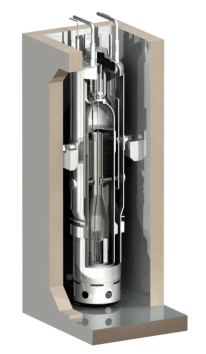forum
library
tutorial
contact

Small Modular Reactor
Bill Passes State Senate
by Annette Cary
Tri-City Herald, June 30, 2015
|
the film forum library tutorial contact |

|
Small Modular Reactor
by Annette Cary
|
 A bill to support the manufacturing of small modular reactors in Washington state passed the state Senate 31-12 on Tuesday as the Legislature wrapped up its work.
A bill to support the manufacturing of small modular reactors in Washington state passed the state Senate 31-12 on Tuesday as the Legislature wrapped up its work.
As of 8 p.m. Tuesday, however, the House had yet to consider it.
Sen. Sharon Brown, R-Kennewick, said that if it did not pass, she would be back with the bill next year.
It had bipartisan support in the Senate, plus the support of the governor, she said.
Senate Bill 5113 would require the Department of Commerce to coordinate and advance the manufacturing of small modular reactors in the state to make sure that Washington is a player in what could be a new energy production field. It also would promote a clean-energy education program, which would include nuclear power.
"The bill says that we will lay the groundwork to make sure that Washington is competitive for nuclear and other clean-energy jobs now and for years to come," Brown said.
"Washington has the in-state expertise to begin looking at the supply chain for the components of small modular reactors. We have the intellectual capital," she said.
There is interest in the Tri-Cities for positioning the community as a center for assembling or manufacturing the small nuclear plants to be shipped around the world, including to Asia. The reactors are proposed to be manufactured in modules and then shipped to where they will be used, with additional modules added as demand for electricity production increases.
Brown is concerned that nearby states are gaining an edge in the field. Oregon is home to NuScale Power, which is developing a small modular reactor, and NuScale is working with Utah Associated Municipal Power Systems and Energy Northwest to operate its first small reactor, likely in Idaho.
"So are we going to forge a path to more manufacturing jobs, and more gainfully employed residents, or are we going to sit back and watch states around us take our intellectual capital and dominate this industry?" she asked.
Added to the bill is a requirement that the state Department of Commerce and the Office of the Superintendent of Public Instruction prepare a joint report to the Legislature by Dec. 1 with recommendations for a clean-energy education program.
The program would be required to include grants both for clean-energy ambassadors and for professional development for teachers.
The clean-energy ambassadors would visit classrooms to introduce students to clean energy science and technology. They could cover solar and wind power, small modular reactors and opportunities for nuclear waste cleanup technology careers.
Certified science teachers could receive grants to help them pursue professional development opportunities in clean-energy science and broaden their exposure to the field.
"One way to ensure that young people understand nuclear energy is to introduce them to our many great scientists, engineers and others who work in the nuclear field," Brown said. "It's also one of the best ways to guarantee that the next-generation of Washington job-seekers is prepared for opportunities in emerging nuclear and other clean-energy fields."
learn more on topics covered in the film
see the video
read the script
learn the songs
discussion forum
